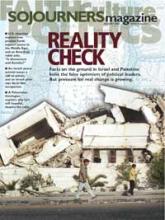The Presbyterian Church (USA) began a process last year to scrutinize the churchs investments in selected U.S. corporations doing business in the Israeli Occupied Territories. Now that other U.S. denominations (and universities) are discussing similar proposals, the Presbyterian experience offers a useful model concerning its content, timing, ethical dimensions, and the opposition it has generated.
Within a month of the PC (USA) decision, Harvard law professor Alan Dershowitz attacked the church in a L.A. Times article, claiming the "Presbyterian Church (USA) has committed a grievous sin" with its decision that "effectively calls for the end of Israel." Chicago Tribune writer Ron Grossman placed the decision in the context of the Crusades, the Spanish Inquisition, and the Holocaust.
By fall 2004, a climate of mistrust and tension had developed between the Presbyterian Church and mainstream Jewish organizations, despite national and regional discussions where the church sought to explain all aspects of the decision. In early October 2004, denomination headquarters and churches nationwide received an arson threat that claimed churches would be targeted on a particular weekend. Fortunately, there were no terrorist attacks, and several Jewish organizations condemned the threat.
Read the Full Article

